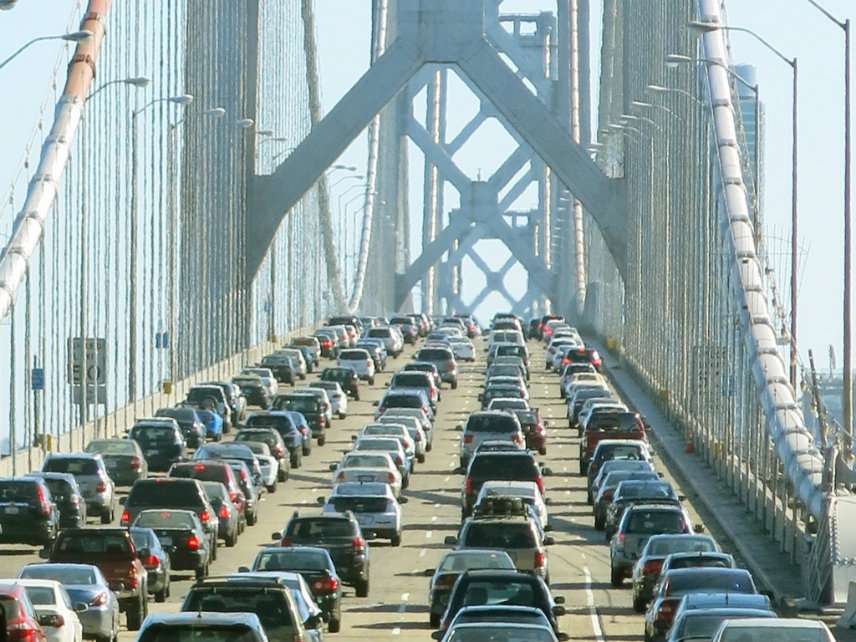Cities Need Mobility, Not Monopolies
San Francisco's anti-competitive regulation of a private transit service

San Francisco's traffic is terrible. Bay Area drivers lose 78 hours and $1,675 to traffic delays each year, making the metropolitan region the third most congested in the country. So you might expect city officials to appreciate the private bus service Chariot. Created in 2014, the company carries 3,000–4,000 commuters a day, taking cars off the road and reducing the strain on the city's Muni buses.
You might expect that, but you'd be wrong. Instead of welcoming Chariot, officials are trying to throttle its growth.
Next Tuesday the San Francisco Municipal Transportation Agency (SFMTA) will vote on new regulations aimed at keeping private transit services like Chariot off the city's bus routes. Existing Chariot lines would be grandfathered in, but new routes could not cover more than 75 percent of an existing Muni bus path. Effectively, this would keep the company from competing directly with SFMTA for ridership.
For some observers, that is the entire point. "The City needs to be asking a soul-searching question—is private transit really the right way to do things?" the San Francisco State University geographer Jason Henderson asked the San Francisco Examiner.
Yes, says Baruch Feigenbaum, a transportation policy analyst at the Reason Foundation (the nonprofit that publishes this website). "I think anytime you have competition, it's good," he says, adding that private transit services like Chariot have the potential to attract new riders with quicker and more flexible service.
"There is an induced effect, where people who didn't take transit before because they didn't think it was a good fit for them are now choosing transit," Feigenbaum notes. Transit agencies, he says, should have the goal of increasing ridership, "not protecting their turf."
This will not be the first time San Francisco took it upon itself to limit private transportation alternatives. Up until the 1970s, a robust network of private jitneys ferried some 7,000 daily riders all over the city. But in 1972 the city stopped issuing new licenses to jitneys, and in 1978 a new taxi medallion law prevented jitney licenses from being resold. With drivers unable either to acquire a new license or to purchase an old one, the industry quickly collapsed.
Chariot won't necessarily meet the same fate. The regulations on offer are restrictive, but they need not prove deadly. The company also has the financial backing of Ford, which purchased it for a reported $65 million last year.
But why keep it—and other companies—from fulfilling consumers' needs? In a dense, growing city like San Francisco, local officials should think less about how to hang on to a transit monopoly, and more about how to make the place as mobile as possible.
Rent Free is a weekly newsletter from Christian Britschgi on urbanism and the fight for less regulation, more housing, more property rights, and more freedom in America's cities.
Editor's Note: As of February 29, 2024, commenting privileges on reason.com posts are limited to Reason Plus subscribers. Past commenters are grandfathered in for a temporary period. Subscribe here to preserve your ability to comment. Your Reason Plus subscription also gives you an ad-free version of reason.com, along with full access to the digital edition and archives of Reason magazine. We request that comments be civil and on-topic. We do not moderate or assume any responsibility for comments, which are owned by the readers who post them. Comments do not represent the views of reason.com or Reason Foundation. We reserve the right to delete any comment and ban commenters for any reason at any time. Comments may only be edited within 5 minutes of posting. Report abuses.
Please to post comments


The whole point is government wants power to limit your mobility. The whole "driving is a privilege" bullshit is proof.
Mobility means a lack of control, a lack of 'legibility'. It means people going about all sorts of business on all sorts of schedules and that makes it *hard* for city planners to plan, you know.
Better to have everyone on the city-run buses running on set schedules. There's a time for work and a time for play and a place for every man and every man in his place.
Turn, turn, turn...
From the linked article, which I found at least a little interesting (the article, not necessarily the below quote):
When she died, Di Pilla kept it open as a place to meet up with friends. Nowadays, his children are running the store and the commercial buildings, which are 100 percent Latino occupied, his daughter said.
So, a tenement building? They must be white...
Its days are numbered.
Part of the local Prog historiography is that the Bay Area was once served by an ideal system of trains that was purchased in the mid-40s by a joint venture of GM, Firestone, and Phillips Petroleum, who decommissioned the trains and replaced them with busses, thus accelerating World Destruction and further aggravating the Persecution of the Poor.
Every Bay Area Prog carries this narrative around in xis back pocket as Exhibit One of the evils of free market capitalism.
If Ford has a bus company that it's using to try to undermine a Bay Area public transit system, expect #resistance.
Just to clarify:
The obvious end-game is that Ford will use the bus company to drive SF public transit out of existence, so that it can then eliminate the busses and force everyone to buy cars.
Ford's market share among prog-leaning car buyers is what? ... in the 1-2% range? An elaborate plot to sell an extra 15 vehicles in the Bay Area!
I wonder if you asked people "Can the government hold a monolopy?" How many would outright answer no.
California.
Secede already, and take Hawaii with you.
Suffering is good for the soul and San Francisco cares deeply about your soul.